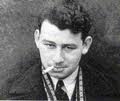 A while back Charlie Jane Anders at io9 did a piece on how serving in the military influenced science fiction writers. She did a good job. However, since my interest is in the golden age writers, I thought a world war two veteran would be a good subject to analyse.
A while back Charlie Jane Anders at io9 did a piece on how serving in the military influenced science fiction writers. She did a good job. However, since my interest is in the golden age writers, I thought a world war two veteran would be a good subject to analyse.
Most science fiction writers of the post world war era served in one capacity or another; some in civilian jobs, and a very few in combat. This latter esoteric group contains an author I have always admired for his unique style. He not only served in combat, he was decorated for bravery.
Cyril M Kornbluth received a Bronze star and at the same time a chronic heart condition during the Battle of the Bulge. Fred Pohl, Kornbluth’s friend and writing partner says Cyril wouldn’t talk about his experience as a heavy machine gunner. Evidently his commanding officer was impressed enough with Cyril’s action during the battle to nominate him for the fifth highest combat decoration the United States awards her service personal. Undoubtedly, the experience traumatize Kornbluth. I am quite sure he saw his share of dead and mutilated men, men cracking under the strain of combat, and all the other madness that occurs in war . Rather than portraying men that couldn’t “take it” as cowards, he exhibits compassion for them in his writing. He probably knew it could just as easily have been him.
One of his post war stories, The Quaker Cannon, has as it’s protagonist an officer captured and tortured twice; both times he breaks and reveals what he knows to the enemy. This soldier is treated with a great deal of empathy by the author, revealing an understanding for those that could not hold up under strain. In fact, this character receives the Distinguished Service Cross. Perhaps giving this character a decoration higher than the one he received shows more than empathetic understanding. Perhaps he is expressing the “why me?” so many men that survive war ask.
Another of Kornbluth’s stories that allows us to gain some insight into the influence his war experience had on his writing is The Silly Season. The title refers to a term used in journalism for a period, usually in summer, when decent news stories are in short supply, and not quite news worthy stuff gets printed. This story’s main character is a journalist investigating unusual happening in the Midwest that begin during the “silly season” of late summer. A few pages in Kornbluth introduces a secondary character that was once a rising star in journalism. Blinded while serving as a combat correspondent, he returns to his hometown and resumes a “normal” life. He is the one that breaks the story of the strange occurrences, and ultimately is the only one that understands what is actually happening. It seems obvious that Cyril Kornbluth is encouraging men, wounded so severely, to live a productive life.
Combat changes values and perspectives. Some men become hard and cynical accepting death as inevitable. Others see death and destruction as happening to those around them but not to themselves. This is done as a means of managing the constant threat of sudden oblivion and keeping ones sanity in an insane situation. A few can’t develop a coping mechanism at all and loose their ability to reason. All are permanently scarred either physically or mentally; some just hide it better than others.
Cyril M. Kornbluth died suddenly at the age of 35. Whether his heart condition was cause by exposure during Hitler’s last gasp or just aggravated by it we’ll never known. The point is he died a young man. If he had taken better care of himself or not shoveled the snow from his driveway that morning maybe he would have lived another 40 or 50 years…or maybe not. One thing is for certain the world of science fiction in particular, and the world in general would be a much richer place if he were around….. even a little longer.